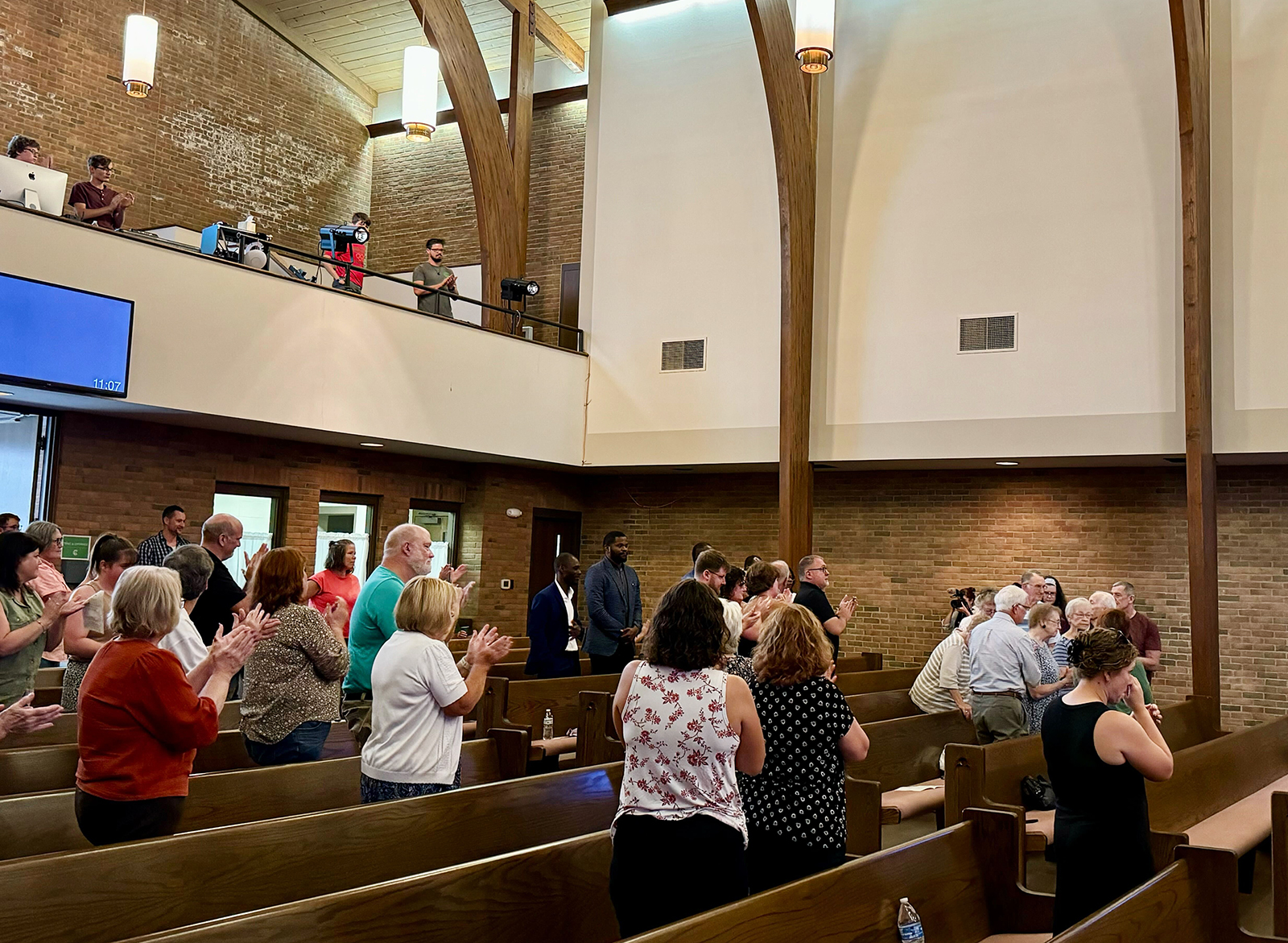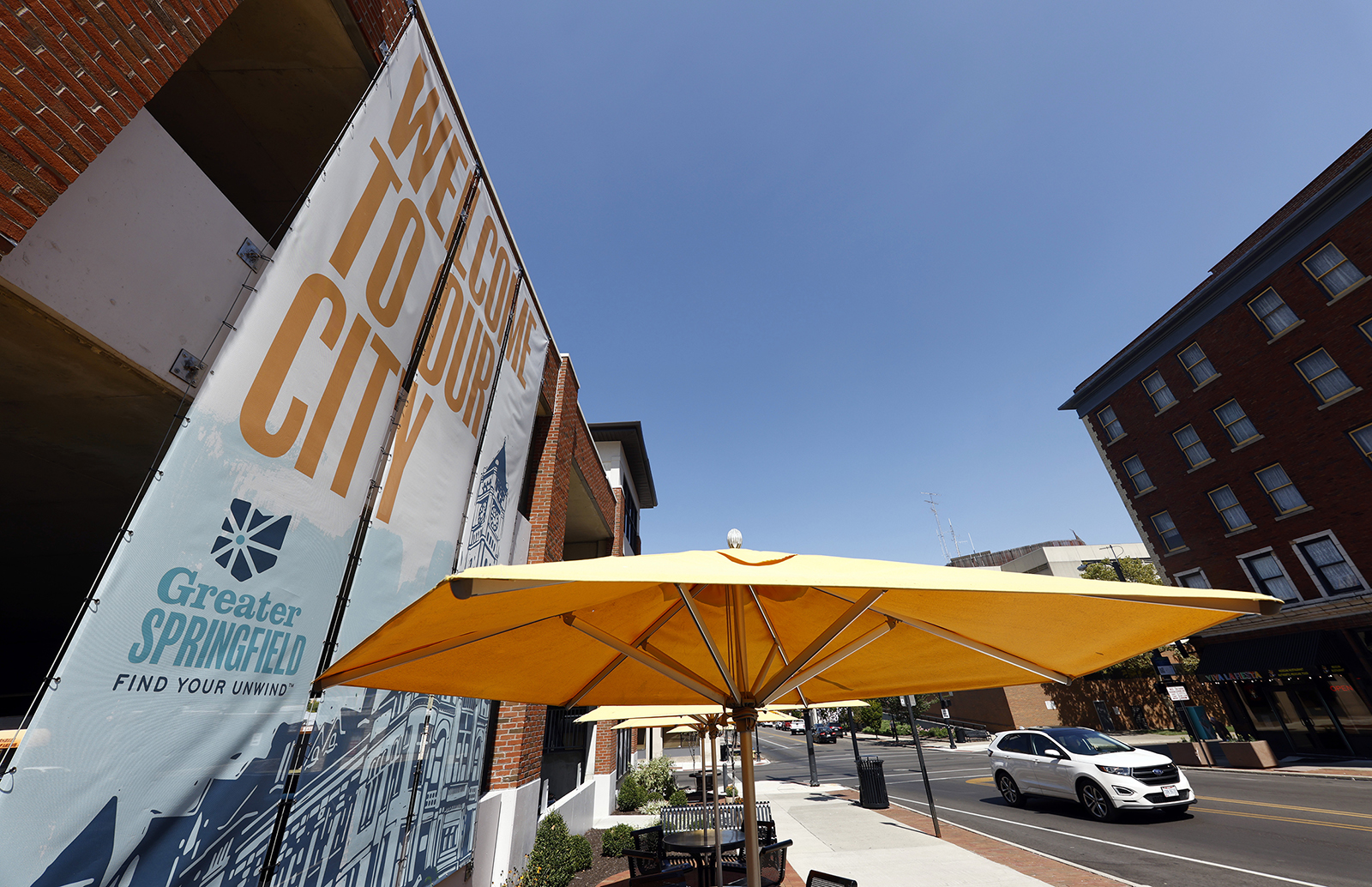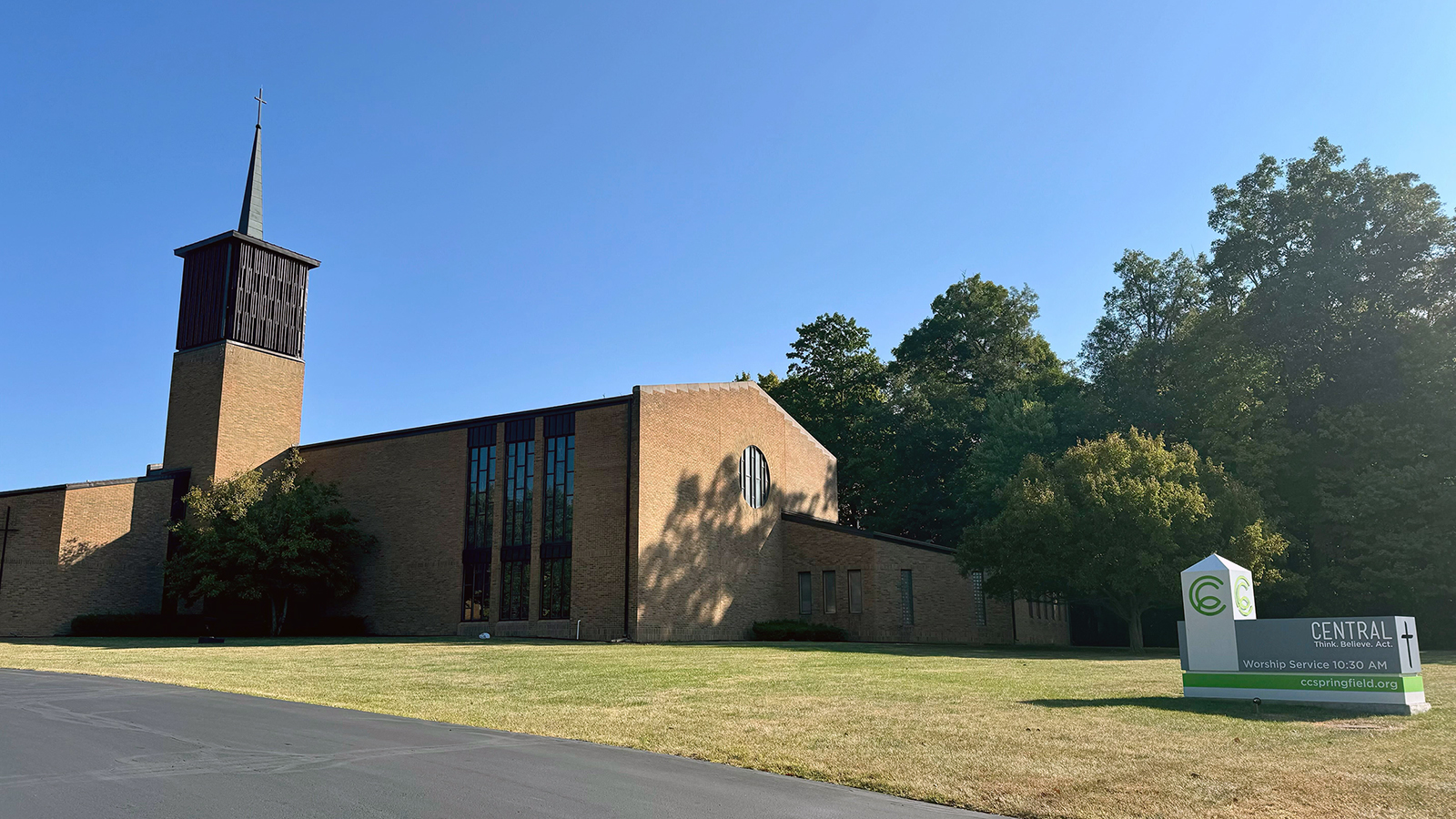
SPRINGFIELD, Ohio (RNS) — “Jesus said that He is the way, the truth and the life. Jesus is with us in truth. And the truth is that Haitians are not eating pets in Springfield,” said the Rev. Carl Ruby, gripping the pulpit of Central Christian Church in Springfield, Ohio.
Moments later, the 60-person congregation rose to its feet, applauding the five Haitian community leaders visiting Sunday morning (Sept.15).
“We love you,” Ruby said to them. “We are glad you’re here.”
Earlier in the week, the small nondenominational church hadn’t been certain they would be worshipping on Sunday. Bomb threats and the presence of hate groups had the city on edge, but the board voted to meet — and Ruby took the opportunity to appeal to both President Biden and former President Trump.
“I call on our former president, President Trump, out of the goodness of his heart, out of the divine spark of God’s image that lives in every human being, to let people know that he was misinformed about what’s happening in our community, and to ask hate groups who are here to leave,” said Ruby. He also called on President Biden to provide additional resources to support the expanding city, which has seen an influx of as many as 20,000 Haitian migrants in the past decade.

Central Christian Church congregants applaud Haitian community leaders, center, during a service on Sunday morning, Sept. 15, 2024, in Springfield, Ohio. (RNS photo/Kathryn Post)
The appeal came after the midwestern city was thrust into the national spotlight during last week’s presidential debate, when former President Trump claimed Haitian migrants are “eating the pets of the people that live there.”
Since then, the debunked pet-eating line has become a “memeified” punchline. But for community members, effects of the remark have been no joke.
On Thursday (Sept. 12), two schools, Springfield City Hall and Clark County offices, closed in the wake of bomb threats. On Saturday, two Springfield hospitals closed due to bomb threats, and flyers claiming to be from the Trinity White Knights of the Ku Klux Klan — a Kentucky offshoot of the white supremacist group — were reportedly distributed in Springfield.
“Foreigners & Haitians Out,” the flyers read, according to a photo obtained by RNS. “Join us and stand against forced immigration.”
Catholic Charities Southwestern Ohio, which provides legal, interpretation and case management services in Springfield but does not resettle migrants there, has faced verbal and written attacks, chief executive Tony Stieritz told America Magazine.
“My daughter asked me, what’s going on dad?” said Harold Herard, an engineer and member of the Haitian Community Help & Support Center who visited Ruby’s church on Sunday. “I tried to explain to her the situation, but I don’t want to put her in a situation of feeling fear about school.”
On Sunday, patrons and cashiers at a Dunkin’ Donuts in the south end of the city traded rumors about Haitians being arrested and consuming pets. But later that afternoon, a different narrative unfolded just around the corner, where about 60 Haitians met at First Evangelical Haitian Church of Springfield for a weekly English Speakers of Other Languages (ESOL) course. Normally, the classes are stretched to find English-speaking conversation partners. But this week, about 30 volunteers — many of them from local churches — participated.

A weekly English Speakers of Other Languages (ESOL) course, primarily attended by Haitian migrants, meets at First Evangelical Haitian Church of Springfield on Sunday, Sept. 15, 2024, in Springfield, Ohio. (RNS photo/Kathryn Post)
“I am with you in the difficulties,” the Haitian students practiced speaking in English. “Mwen avèk ou nan difikilte yo,” the English-speakers learned to respond in Haitian Creole.
At the end of the event, the English speakers distributed flowers and baked goods, while Haitian leaders thanked them for their solidarity.
“We are in amazement at how so much good is coming out of such difficulty,” said Heidi Earlywine, an English teacher and advocate who co-coordinates the ESOL classes.
Despite the welcoming atmosphere, some Haitian ESOL students voiced concerns about the level of scrutiny they’ve faced in Springfield this week, saying the toxic atmosphere had pushed them to consider relocating out of state. Viles Dorsainvil, president of Springfield’s Haitian Community Help and Support Center and a former Moravian pastor, said he’s also heard Haitians debating whether to leave Springfield. But he hopes people stay a few more weeks before deciding.
“We have so many good leaders working with us,” said Dorsainvil. “And we do our best in our nonprofit to work through this situation with the community. I think that if we just take our time, we will navigate this together. But the tension is here. The fear is here.”

A car drives down Fountain Avenue in Springfield, Ohio, Wednesday, Sept. 11, 2024. (AP Photo/Paul Vernon)
Once a bustling manufacturing town that produced farm equipment and other machinery, Springfield faced race riots in the early 20th century, and struggled with closing factories and a declining population at the tail end of the century. Then, about a decade ago, the city launched a successful effort to bring in several businesses and companies that created thousands of new jobs. Haitian migrants facing political turmoil and gang violence in their home country began to arrive, filling job shortages and opening churches, shops and cafes.
“First Baptist Church is one part of a larger faith community and group of public service agencies that believe in the tremendous gifts that come along with the increase in population,” said the Rev. Adam Banks, a Springfield pastor who pointed out the benefit of welcoming skilled Haitian professionals, including educators and health care specialists. “As a city that has seen its population decline for decades, this increase provides a great deal of hope.”
Countering rumors that resettlement organizations have been “bussing in” migrants, Herard said Haitians have arrived organically after hearing about jobs from other Haitians in the area. The vast majority are here legally, many as recipients of Temporary Protected Status due to conditions in Haiti. Springfield’s Haitian population has swelled to between 12,000-20,000 in recent years, city officials estimate.
Some longtime Springfield residents called the “pet-eating” rhetoric a distraction from the very real strains on local health, education and government resources facing the city. The influx of residents has, according to many business owners, landlords and city officials, been a boon for the declining city, but it has also come with costs. Schools and hospitals are struggling to keep up with the growing population and the need for translation services and ESOL classes. Housing costs have risen, and the sudden increase in new drivers has prompted safety concerns.
In August 2023, tensions between Haitians and longtime Springfield residents ruptured when 11-year-old Aiden Clark was killed in an accident caused by a Haitian migrant who crashed into a school bus. (Clark’s parents have since asked that their family’s tragedy not be used to stoke hatred or be exploited for political gain.)
City Council meetings were suddenly flooded with concerned residents, and Haitians became the targets of beatings and robberies. First Evangelical Haitian Church of Springfield was reportedly broken into. But the fractures were subsiding when, this summer, Republican vice presidential nominee and Ohio Senator J.D. Vance cited Springfield as a failure of Biden’s immigration strategy.

Central Christian Church in Springfield, Ohio. (RNS photo/Kathryn Post)
“It really kind of quieted down until our local leaders reached out to J.D. Vance for help getting financial assistance,” said Ruby. “And instead of providing financial assistance, he politicized it.”
Herard said Springfield’s Haitian community is most in need of better translation services, as well as mental health support, particularly in the wake of last week’s debate. For now, many of Springfield’s churches are giving support by way of English classes, correcting misinformation, and displaying solidarity. At the end of Central Christian Church’s Sunday service, congregants shuffled to the front of the sanctuary where they took Communion elements and bundles of small fliers intended for distribution.
“Mwen byen kontan ou la. Kris la renmen ou e mwen menm tou,” the fliers said in Haitian Creole. “I’m glad you are here. Christ loves you and so do I.”
To Herard, the service was a welcome respite. “It was a tough week,” he said. “Fear. Confusion. But today, we feel free.”
Source link




